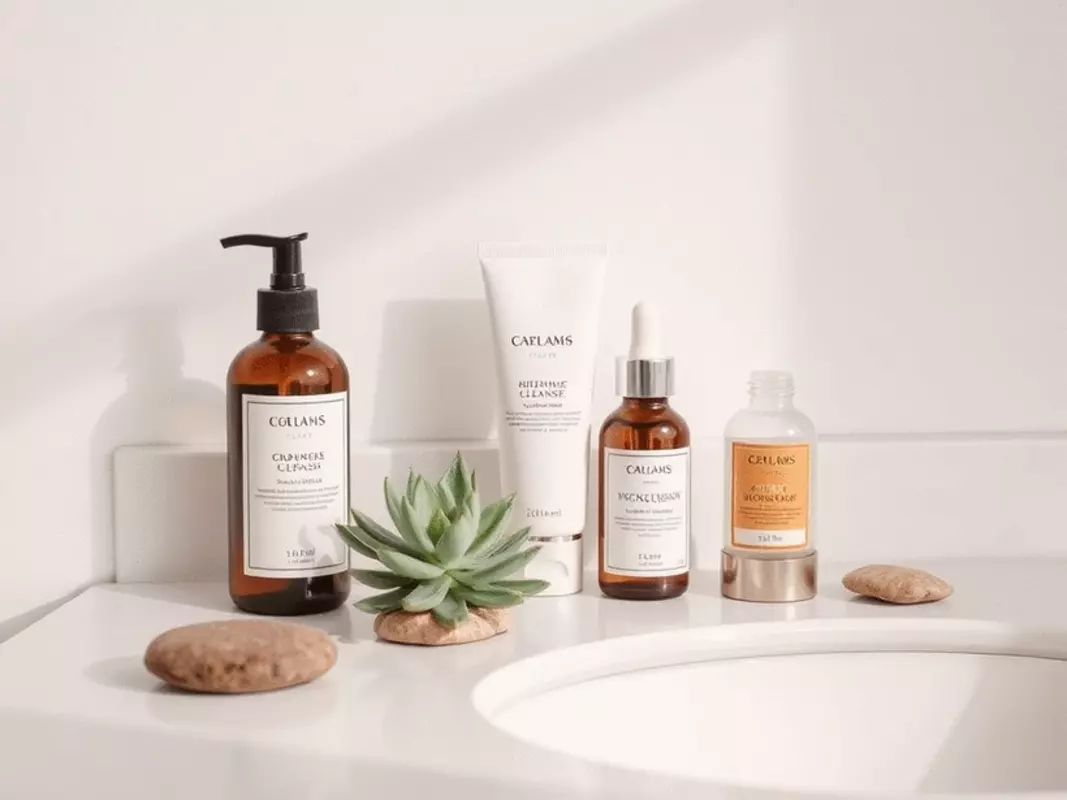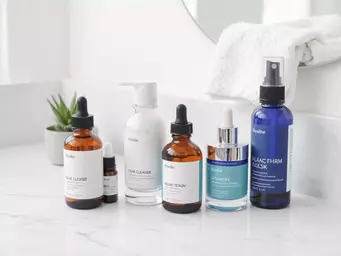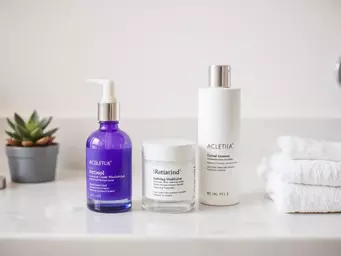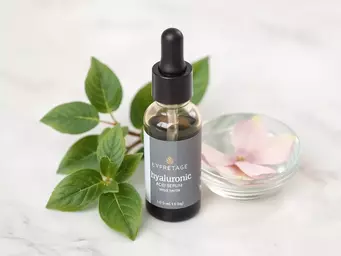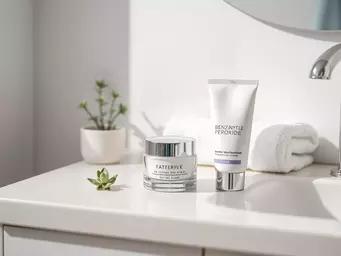Choosing Cleanser for Dry Acne Skin
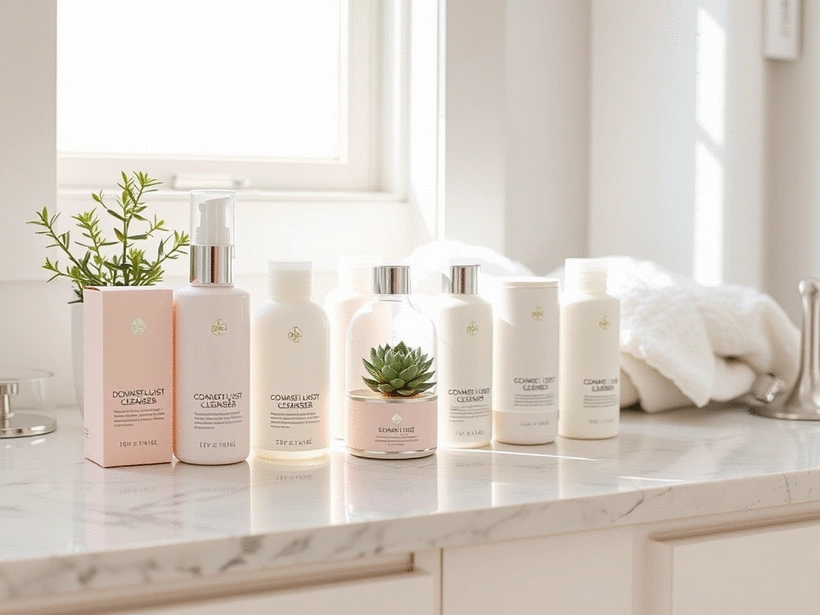
Have you ever felt torn between managing dryness and dealing with acne? For many, this struggle is all too real. Understanding the specific needs of dry, acne-prone skin can pave the way to achieving a clear and hydrated complexion. Let’s uncover essential tips and strategies to help you navigate this complex skincare journey.
What You Will Learn
- Choosing the right cleanser is crucial to maintain your skin's moisture barrier while effectively targeting acne.
- Common challenges of dry, acne-prone skin include flakiness, increased sensitivity, and difficulty finding suitable products.
- Hydrating ingredients like hyaluronic acid and squalane are essential for achieving balanced, healthy skin.
- Avoid harsh ingredients like alcohol and strong acids to prevent exacerbating dryness and irritation.
Key Considerations for Dry, Acne-Prone Skin
Understanding the unique challenges and effective solutions for dry, acne-prone skin involves focusing on cleansing, ingredient awareness, and a balanced routine. This visual highlights critical aspects to consider for healthier skin.
Why Cleanser Choice Matters
- • Prevents Over-Drying
- • Promotes Clear Skin
- • Reduces Irritation
Common Challenges Faced
- • Flakiness
- • Breakouts
- • Increased Sensitivity
Key Skincare Routine Steps
- • Gentle Cleanser
- • Hydrating Toner/Serum
- • Non-comedogenic Moisturizer
- • Targeted Spot Treatment
Ingredients to Incorporate
- • Hyaluronic Acid (Hydration)
- • Squalane (Non-clogging Moisture)
- • Salicylic Acid (Acne Treatment)
Understanding the Needs of Dry, Acne-Prone Skin
Managing dry, acne-prone skin can feel like an uphill battle. As a dermatologist, I’ve seen so many patients grapple with the frustration of wanting clear skin while also battling dryness and irritation. It's crucial to understand what makes our skin tick, especially when it comes to selecting the right products. Let's explore the unique needs of your skin type and why cleansing is foundational to a successful skincare routine.
Finding a cleanser that addresses both dryness and acne is essential. It’s not just about picking any product off the shelf; it’s about choosing one that nourishes while effectively clearing away impurities. This balance is key to achieving hydrated, clear skin. Are you ready to discover how to tackle this challenge?
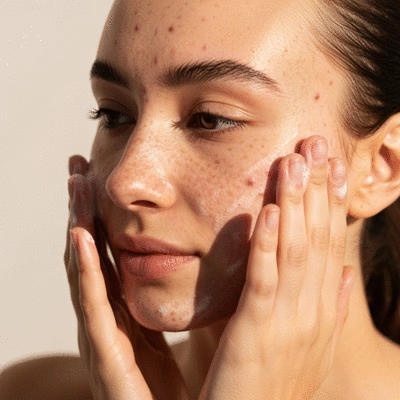
Why Choosing the Right Cleanser Matters
Choosing the right cleanser is a game-changer for anyone with dry, acne-prone skin. A good cleanser can help remove excess oil and debris without stripping away your skin's natural moisture. As the American Academy of Dermatology (AAD) emphasizes, gentle cleansing is vital for managing acne. Here are some reasons why it's so important:
- Prevents Over-Drying: The right cleanser helps maintain your skin's moisture barrier, preventing that tight, uncomfortable feeling.
- Promotes Clear Skin: Using a cleanser formulated for acne can prevent breakouts while being gentle on dry patches.
- Reduces Irritation: Many harsh cleansers can exacerbate dryness and inflammation, but a suitable one calms the skin.
Each of these points underscores the importance of being thoughtful about your cleanser choice. With the right product, you can achieve a balance that supports your skin’s health!
Common Challenges Faced by Those with Dry Skin and Acne
Many individuals with dry, acne-prone skin face several challenges in their skincare journey. These issues often include:
- Flakiness: Dry skin can lead to flaky patches that are both unsightly and uncomfortable.
- Breakouts: The struggle with acne can intensify when skin is dry, as some treatments exacerbate the issue.
- Increased Sensitivity: Skin may react more intensely to products, making it hard to find suitable solutions.
Understanding these challenges is crucial for developing an effective skincare routine. At Dry Acne Solutions, I aim to equip you with the knowledge and tools you need to navigate these hurdles successfully.
The Role of Skin Type in Selecting Cleansers
When it comes to selecting a cleanser, your specific skin type plays a significant role. For those of us with both dryness and acne, a tailored approach is essential. The National Center for Biotechnology Information highlights the importance of considering skin characteristics in product selection. Here’s what to consider:
- Skin Sensitivity: If your skin is sensitive, look for gentle, hypoallergenic formulas.
- Ingredient Focus: Opt for formulations that include hydrating ingredients, but also target acne with appropriate active components.
- Texture Preference: Creamy or gel cleansers can behave differently; choose based on what feels best on your skin.
By understanding your skin type and its needs, you can make informed decisions that lead to healthier skin. Remember, it’s all about finding that perfect match for your unique skincare journey!
We Want to Hear From You!
What has been your biggest challenge in managing dry, acne-prone skin? Share your thoughts below:
Long-Term Skin Health and Care Considerations
Building a skincare routine that addresses both dryness and acne is essential for long-term skin health. At Dry Acne Solutions, I've witnessed how a tailored approach can make all the difference for individuals struggling with these dual challenges. Let's dive into how you can create an effective skincare routine that promotes healthy, balanced skin!
Building a Skincare Routine for Dry, Acne-Prone Skin
Your skincare routine should focus on both hydration and acne control. Start with a gentle cleanser that suits your skin type, followed by a hydrating toner or serum. Then, choose products that specifically target acne without stripping away moisture. Remember, the right balance is key!
- Cleanser: Opt for a gentle, hydrating cleanser.
- Toner: Use a hydrating toner with soothing ingredients.
- Serum: Incorporate a serum with hyaluronic acid for added moisture.
- Moisturizer: Choose a lightweight, non-comedogenic moisturizer.
- Spot Treatment: Use targeted treatments with salicylic acid or benzoyl peroxide.
Each step plays a vital role in maintaining your skin's health. By following this routine consistently, you're setting the stage for clearer and more hydrated skin over time. Don't forget to listen to your skin—adjust your routine based on how your skin responds!
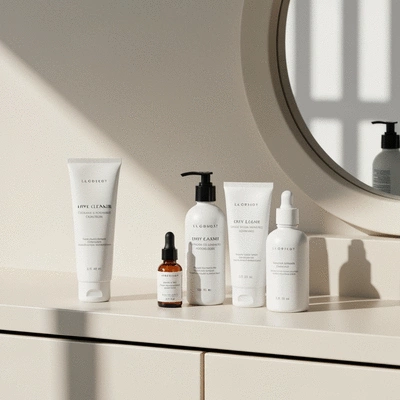
Identifying and Avoiding Irritating Ingredients
Being proactive about ingredient selection can greatly enhance your skincare journey. Avoid harsh ingredients that can exacerbate dryness and irritation. Here are some common irritants to watch out for:
- Alcohols: Especially drying forms like ethanol or isopropyl alcohol.
- Fragrance: Even natural fragrances can trigger sensitivities.
- Harsh Exfoliants: Physical scrubs can irritate and damage the skin barrier.
- Strong Acids: High concentrations of glycolic or citric acid may be too aggressive.
Paying attention to ingredient labels helps you steer clear of products that could worsen your skin's condition. Remember, gentleness is the way to go!
The Benefits of Hydration: Incorporating Hyaluronic Acid and Squalane
Hydration is crucial in managing dry, acne-prone skin. Two standout ingredients are hyaluronic acid and squalane. Cerave provides additional insights into treating dry, acne-prone skin, emphasizing the role of such hydrating ingredients. Here’s why they should be staples in your routine:
- Hyaluronic Acid: A powerful humectant that attracts moisture to the skin, keeping it plump and hydrated.
- Squalane: Mimics the skin's natural oils, providing deep hydration without clogging pores.
Incorporating these ingredients will not only keep your skin hydrated but also help in reducing the appearance of fine lines and improving overall texture. Don’t underestimate the power of hydration! It can transform your skin's health.
Frequently Asked Questions (FAQs)
- Q: Why is choosing the right cleanser so important for dry, acne-prone skin?
A: A suitable cleanser helps remove impurities without stripping the skin's natural moisture, preventing over-drying, promoting clear skin, and reducing irritation. - Q: What are common challenges faced by individuals with dry, acne-prone skin?
A: Common challenges include flakiness, persistent breakouts, and increased skin sensitivity, making it difficult to find compatible products. - Q: What key ingredients should I look for in skincare products for dry, acne-prone skin?
A: Look for hydrating ingredients like hyaluronic acid and squalane, which provide moisture without clogging pores, and gentle acne-fighting ingredients like salicylic acid. - Q: Which ingredients should I avoid if I have dry, acne-prone skin?
A: Avoid harsh alcohols, fragrances, abrasive physical exfoliants, and high concentrations of strong acids, as these can exacerbate dryness and irritation. - Q: How can I build an effective skincare routine for dry, acne-prone skin?
A: Start with a gentle cleanser, followed by a hydrating toner or serum, a non-comedogenic moisturizer, and targeted spot treatments. Consistency and listening to your skin are key.
Recap of Key Points
Here is a quick recap of the important points discussed in the article:
- Choose the Right Cleanser: Opt for a gentle, hydrating cleanser that helps maintain moisture while addressing acne.
- Understand Your Skin Challenges: Be aware of issues like flakiness, breakouts, and increased sensitivity in dry, acne-prone skin.
- Tailor Your Skincare Routine: Focus on hydration and acne control by incorporating products like a hydrating toner, serum, and lightweight moisturizer.
- Avoid Irritating Ingredients: Steer clear of alcohols, fragrances, and harsh exfoliants that can worsen dryness and irritation.
- Incorporate Hydration Boosters: Use ingredients like hyaluronic acid and squalane to keep the skin hydrated and improve overall texture.



